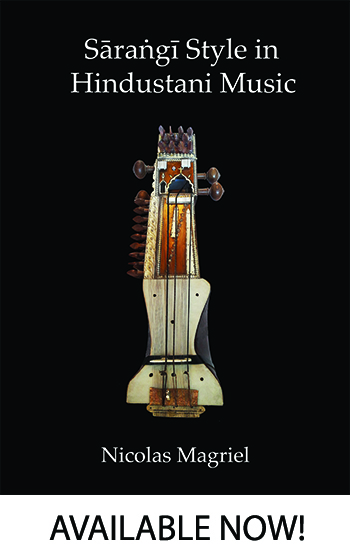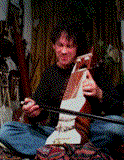
I met Ashiq Ali Khan when he was resident in Agra and filmed him extensively with his sons Ashraf Ali and Asif Ali on March 23, 1995. His easy-going optimistic manner impressed me—talking about a congenital deformity of his left-hand that severely impinged on his sarangi technique. His two sons also suffered from this handicap. All were courageous talking about it and practising obsessively despite the handicap. Ashiq Ali's wife also came from a sarangi family. She recalled how her elders used to make their own gut sarangi strings, an art which has been lost in the world of classical sarangi. It still survives among the Langas and Manganiyars of Westerm Rajasthan.
I'm forever grateful to Ashiq Ali's son Arif Ali for taking me to the Wazir Pura naighborhood of Agra where gut sarangi strings are manufactured—a cottage industry involving many members of an extended family.
Ashraf Ali and Asif Ali taught me several very interesting rhythmic exercises—for instance counting forwards to and backwards from successive numbers while staying faithful to the tala cycle.
Towards the end of my stay in Agra, Ashiq Ali was rushed to hospital. I said goodbye to him there.
Our first video is of Ashiq Ali playing rag Brindabani Sarang and some discussion:
-
Then the younger son Arif Ali played a short and unconvincing rag Bihag:
-
Then more discussion with Ashiq Ali Khan:
-
Our next meeting was on March 12, 1995. Arif Ali talked about practise adn demonstrated several fascinating melodic and rhythmic exercises:
-
Then Ashraf Ali played rags Multani and Kirwani, also rather unconvincingly. In Multani he played the famous drut ektal bandish "nainana mein aaanabaana" with his brother keeping tal verbally—an interesting style of collaborative practise.
-
Our last video is of my visit to Wazir Pura, Agra with Arif Ali Khan, observing all the stages of manufacturing gut sarangi strings. This is covered in some detail in my book Sarangi Style in Hindustani Music.
-



